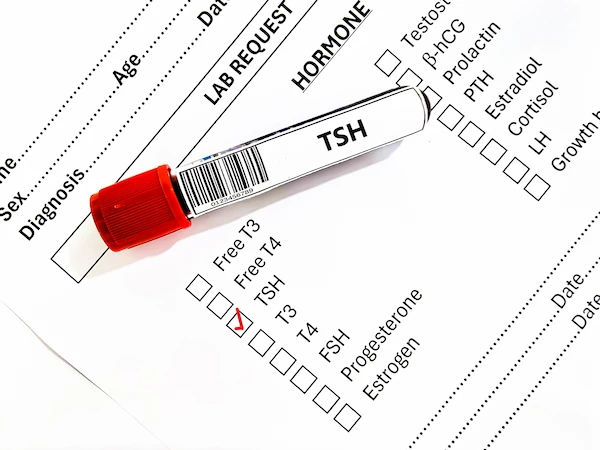6 Must-Do Blood Tests for Men Over 40
Discover the 6 essential blood tests every man over 40 should consider. Learn how these tests can help detect early signs of heart disease, diabetes, hormone imbalance, and more.

Written by Dr. Rohinipriyanka Pondugula
Reviewed by Dr. Siri Nallapu MBBS
Last updated on 9th Sep, 2025

As men cross the age of 40, their bodies undergo significant changes. This period often brings new health challenges, with an increased risk of conditions like heart disease, diabetes, and prostate issues. While you might feel healthy, this is a crucial time to take a more active role in your health. Regular health check-ups, especially specific blood tests, can act as an early warning system, helping to spot potential problems before they become serious.
Why Age 40+ Matters for Men's Health
For men, the years after 40 often mark a shift in health priorities. Metabolism can slow down, energy levels might dip, and the risk of chronic diseases tends to rise. This age group often faces high-stress careers and family demands, which can lead to less healthy habits like poor diet, lack of exercise, and increased stress. These factors, combined with genetics, can increase the risk of Heart Disease, Diabetes, Hormonal Changes and Prostate Health Issues. Being proactive with certain blood tests can help you and your doctor understand your body's unique needs at this stage, allowing for timely adjustments to your lifestyle or medical care.
6 Essential Blood Tests for Men Over 40
Here are six key blood tests that can provide valuable insights into your health as you age:
1. Lipid Profile
A Lipid Profile measures the different types of fats (lipids) in your blood, including cholesterol and triglycerides. High cholesterol is a major risk factor for heart disease, which is a leading health concern for men over 40.
Why it matters: High levels of "bad" cholesterol (LDL) can lead to plaque buildup in your arteries. This plaque narrows the arteries, making it harder for blood to flow to your heart, increasing your risk of heart attacks and strokes. Monitoring these levels is vital for preventing serious heart problems.
What it measures:
- Total Cholesterol
- HDL Cholesterol (High-Density Lipoprotein)
- LDL Cholesterol (Low-Density Lipoprotein)
- Triglycerides
What it Means: Your doctor will look at the balance of these fats. High LDL or triglycerides mean you have a higher risk of heart disease, and managing these levels through diet, exercise, or medication is crucial.
2. Blood Sugar Tests
The risk of developing type 2 diabetes increases significantly for men over 40, especially if there's a family history, excess weight, or an inactive lifestyle. High blood sugar can silently damage your organs over time, leading to serious complications if not managed.
Why it matters: Diabetes can affect your energy, vision, nerve health, kidney function, and increase your risk of heart disease. Catching high blood sugar early (even at the prediabetes stage) allows you to make lifestyle changes to prevent or delay full-blown diabetes.
What it measures:
- Fasting Blood Sugar (FBS): Checks your blood sugar level after you haven't eaten for at least 8-12 hours (usually overnight).
Normal: Below mg/dL (5.6 mmol/L)
Prediabetes: 100−125 mg/dL (5.6−6.9 mmol/L)
Diabetes: 126 mg/dL (7.0 mmol/L) or higher (on two separate tests). - Glycated Haemoglobin (HbA1c): Gives you an average of your blood sugar levels over the past 2-3 months. It's a great way to see how well your blood sugar has been controlled over time.
Normal: Below 5.7
Prediabetes: 5.7
Diabetes: 6.5 or higher.
What it Means: High blood sugar levels in these tests indicate impaired sugar control. Early detection means you can take steps to manage your blood sugar, often through diet and exercise, and potentially avoid diabetes or its complications.
3. Testosterone
Testosterone is the primary male sex hormone, crucial for energy levels, muscle mass, bone density, sex drive, and mood. After age 30, a man's testosterone levels naturally begin to decline by about 1% per year. By 40, this decline can become more noticeable for some.
Why it matters: Low testosterone (sometimes called "Low T" or hypogonadism) can lead to symptoms like fatigue, reduced sex drive, erectile dysfunction, loss of muscle mass, increased body fat, mood changes, and difficulty concentrating. Checking your levels can help determine if these symptoms are related to a hormonal imbalance.
What it measures:
- Total Testosterone
- Free Testosterone
What it Means: Lower-than-normal testosterone levels can explain some of the symptoms you might be experiencing. If levels are low, your doctor can discuss lifestyle changes or other treatments to help improve your well-being.
4. Prostate-Specific Antigen (PSA)
The prostate is a small gland in men that produces fluid for semen. As men age, the prostate can enlarge (a common condition called Benign Prostatic Hyperplasia or BPH) or, less commonly, develop cancer. The PSA test is a blood test used to screen for prostate health issues.
Why it matters: Early detection of prostate problems, including prostate cancer, can lead to more effective treatment. While the PSA test is not perfect and can be elevated for reasons other than cancer, it's an important tool for discussion with your doctor, especially if you have symptoms or a family history of prostate cancer.
What it Means:
- Elevated PSA levels: Can indicate an enlarged prostate, inflammation of the prostate (prostatitis), or prostate cancer.
- Normal PSA levels: Generally, lower PSA levels are better, but what's considered "normal" can depend on age and other factors. Your doctor will interpret your result in the context of your overall health and risk factors.
Discussing your PSA results with your doctor is crucial to decide if further tests, like a prostate exam or biopsy, are needed.
Book a Prostate-Specific Antigen now
5. Complete Blood Count (CBC)
The Complete Blood Count (CBC) is a fundamental blood test that provides a broad overview of your general health. It can help detect a wide range of disorders, including infections, anaemia, and certain blood disorders.
Why it matters: As men age, conditions like anaemia can still occur, causing fatigue and weakness. The CBC also checks your white blood cells, which are your body's infection fighters, and platelets, which help blood clot. It's a good general health check to ensure all components of your blood are within healthy ranges.
What it measures:
- Red Blood Cells (RBCs) / Haemoglobin (Hb)
- White Blood Cells (WBCs)
- Platelets
What it Means: Abnormalities in your CBC can point to anaemia, an ongoing infection, or other blood-related issues that might affect your energy and overall health.
6. Thyroid Profile
Your thyroid gland produces hormones that control your body's metabolism, energy levels, weight, and even your mood. Thyroid problems can affect men too, and their prevalence increases with age.
Why it matters: An underactive thyroid (hypothyroidism) can cause tiredness, weight gain, feeling cold, hair loss, and mood changes. An overactive thyroid (hyperthyroidism) can lead to weight loss, anxiety, a fast heart rate, and trouble sleeping. These symptoms can easily be confused with stress or just "getting older," making a thyroid check essential for accurate diagnosis and treatment.
What it measures:
- Thyroid Stimulating Hormone (TSH)
- Triiodothyronine (T3) and Thyroxine (T4)
What it Means: Abnormal TSH, T3, or T4 levels indicate a thyroid problem. Getting a diagnosis means you can start treatment, which often involves simple medication, to get your energy and well-being back on track.
Get These Tests To Get A Yourself Checked up
Who Should Get These Tests?
Every man aged 40 and above should consider these blood tests as part of their routine health check-up. They are especially important if you:
- Have a family history of heart disease, diabetes, prostate cancer, or thyroid problems.
- Are experiencing new or worsening symptoms like unexplained tiredness, weight changes, low sex drive, or urinary issues.
- Have lifestyle factors such as smoking, a less active routine, high stress, or dietary concerns.
- Are overweight or obese.
Discussing these tests with your doctor will help create a personalised health plan that suits your needs.
Why Choose Apollo 24|7 for Your Tests?
When you need health tests, you want a service that is reliable, accurate, and easy to use. Apollo 24|7 offers all of this and more. They make it simple to get tested with home sample collection for many blood tests, which is very helpful for busy men. As part of the trusted Apollo Hospitals group, they ensure high-quality, accurate results using advanced lab equipment. They provide a wide range of tests and comprehensive health packages, including those focused on men's health, helping you get a complete picture of your well-being.
Conclusion
Turning 40 is a significant milestone for men's health. By including these six essential blood tests in your regular health routine – covering your heart health, blood sugar, testosterone levels, prostate, general blood health, and thyroid function – you can gain valuable insights into your body's needs. Early detection of any imbalances or potential issues means you can take steps to manage them, often with simple lifestyle changes or medication. Prioritising these tests is a vital step towards maintaining your health, energy, and quality of life for years to come.







